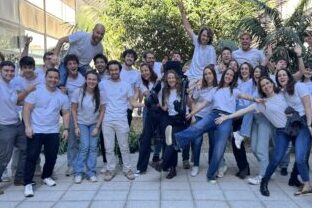3rd February 2023
- During a panel discussion organised by EIT Health Spain on the opportunities of health technology at the IoT Solutions World Congress in Barcelona.
- Healthcare technologies enable leading processes such as healthcare automation, reinforcing connectivity, promoting new technologies and infrastructures throughout the value chain.
Experts have called for more support for the digitisation of healthcare and the health technology sector as a driver of re-industrialisation in Europe.
This was the main message of the session organised by EIT Health Spain as part of the IoT Solutions World Congress in Barcelona. EIT Health Spain is the Co-Location centre (regional hub) of EIT Health, which is part of the European Institute of Innovation and Technology (EIT), a body of the European Union.
In her opening words, Izabel Alfany, Operations Director of EIT Health Spain, referred to PERTE Salud de Vanguardia and IPCEI Med4Cure, as “two major strategic initiatives at Spanish and European level, which highlight the need to make the health sector the driving force behind the reindustrialisation of Europe”.
In this sense, participants agree that digitalisation means great advances in treatment and medication, but also in efficiency and production costs.
For Montserrat Daban, Director of Science Policy and Internationalisation at Biocat, in a global scenario of competitiveness, the health technology sector has a “crucial role” for the reindustrialisation of Europe. “Health technology allow leading aspects such as the automation of healthcare processes like additive manufacturing, virtual and decentralised clinical trials and robotic surgery; reinforcing connectivity in remote care and the use of wearables to monitor patients; facilitating new infrastructures such as cloud and edge computing and technologies like quantum computing, as well as the application of artificial intelligence to diagnosis and drug discovery throughout the value chain”.
In this respect, Sergio Muñoz, Director of Innovation, Digital Health and Emerging Technologies at the Spanish Federation of Healthcare Technology Companies (FENIN) advocates sustainability and the use of data to be more competitive. “Health technologies, together with the design of new healthcare processes, must be the backbone of the transformation of healthcare systems if we want them to adapt to the future needs of our societies”, he explains.
In the opinion of Anaïs LeCorvec, Director General at the Council of European BioRegions (CEBR), due to the speed of change, “it is necessary to reinvent ourselves and to collaborate more actively and together”. On the other hand, Enrique Castellón, CEO of Additum Blockchain and CrossRoad Biotech, believes that it is not only necessary to generate an ecosystem, but also to make it more dynamic. “There is a need for greater interaction between governments, logically including health services and regulatory agencies, research centres and industry, including biotech start-ups.
José Luis Gómez, Vice President of Public Policy for Europe, Middle East and Africa at BD (Becton Dickinson), said: “It improves the efficiency of healthcare systems, patient safety and helps to prevent and manage medication stock-outs. It also enables the generation of data in interoperable formats for the future European Health Data Space (EHDS) on medication prescribed, dispensed and administered to patients”.
Market challenges
In terms of challenges, experts call for addressing problems of stock-outs. “The COVID-19 experience has highlighted the weakness of the medicines supply chain in times of crisis,” says José Luis Gómez.
Montserrat Daban believes it is essential to strengthen technological independence and facilitate the adoption of innovation. “It is necessary to streamline the regulatory aspects of medical devices and accelerate the arrival of solutions on the market,” she said.
In this regard, Sergio Muñoz calls for more agility in decisions and implementation of projects such as the European Health Data Space (EHDS) and calls for “flexible regulatory models that speed up validations”.
“New technologies are leading to extremely expensive products and it is also a market with great uncertainty (due to the unpredictable evolution of epidemic outbreaks). The market is not attractive,” admits Enrique Castellón.
For Anaïs LeCorvec, one of the current challenges is the lack of staff and talent in the health sector, particularly with digitalisation.
EIT Health and the EDIT-B consortium transform bipolar disorder diagnosis with groundbreaking blood test

Discover this life-changing project today.
Three EIT Health innovators nominated for EIT Awards

Meet our three EIT Award nominees.
Hospital Clínic study reinforces patient participation as key to digital health innovation

New work published in Journal of Medical Internet Research.
